To manage eczema, identify and avoid environmental triggers like harsh soaps, cold weather, dust, and irritant fabrics. Watch your diet for common allergens such as dairy, nuts, and eggs, and choose anti-inflammatory foods. Use gentle, fragrance-free skincare products, moisturize regularly, and reduce stress through relaxation techniques. Wearing loose clothing and keeping a routine can also help prevent flare-ups. Continuing will reveal more effective tips to keep your skin calm and healthier.
Key Takeaways
- Identify and avoid common triggers like harsh soaps, cold weather, dust, pet dander, and irritant fabrics.
- Use gentle, fragrance-free skin care products and moisturize immediately after bathing to maintain hydration.
- Manage stress through relaxation techniques such as meditation, yoga, or deep breathing to reduce flare-ups.
- Track dietary responses and limit foods like dairy, eggs, nuts, and processed items that may cause inflammation.
- Maintain a consistent skincare routine, wear breathable clothing, and use humidifiers to support skin barrier health.
Common Environmental Triggers
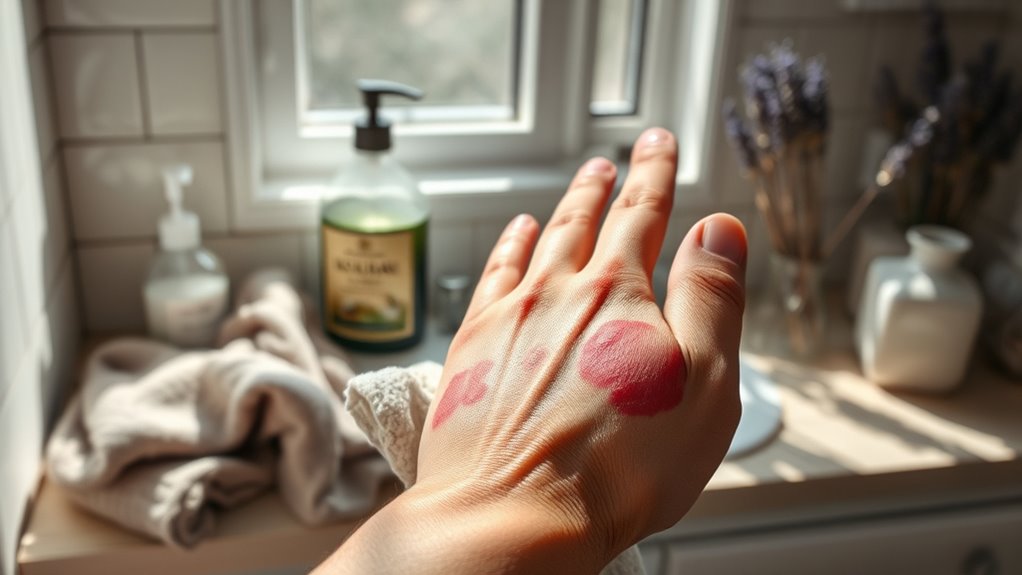
Environmental factors often play a significant role in triggering eczema flare-ups. You might notice that exposure to certain substances or conditions worsens your skin. Common triggers include harsh soaps, detergents, and fragrances that irritate sensitive skin. Weather changes, especially cold, dry air, can strip moisture from your skin, leading to flare-ups. Dust mites and pet dander are also common culprits, especially if you’re allergic. Exposure to cigarette smoke or pollution can inflame your skin and worsen symptoms. Additionally, rough fabrics like wool or synthetic materials can cause irritation. Being aware of these environmental factors helps you take proactive steps, like wearing breathable clothing or avoiding strong chemicals, to reduce flare-ups and keep your eczema under control. Lifestyle choices such as managing your environment can significantly impact your skin health.
Dietary Factors That Affect Eczema
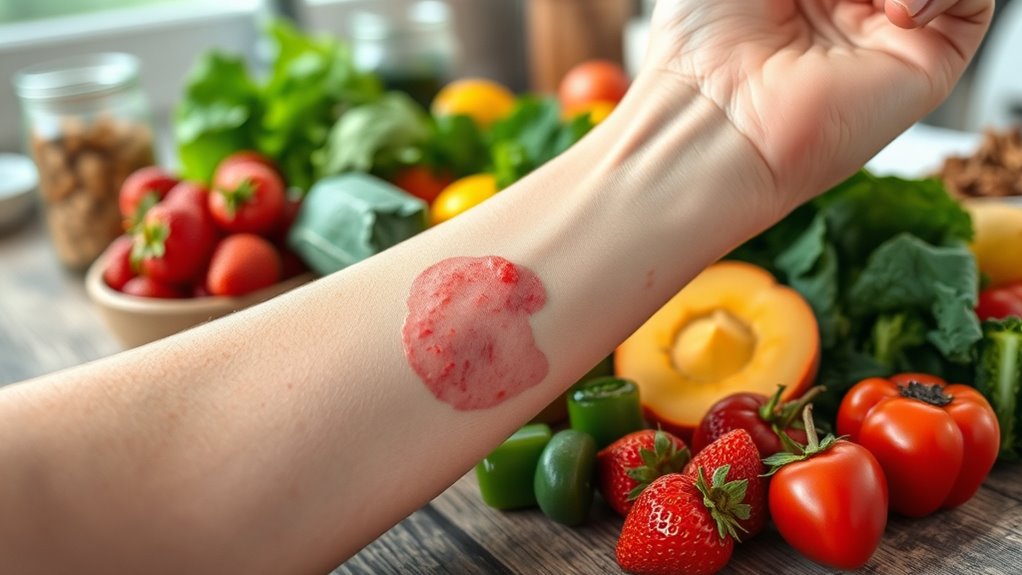
Have you ever noticed that certain foods seem to worsen your eczema symptoms? Some people find that dairy, eggs, or nuts can trigger flare-ups. Food allergies or sensitivities can cause inflammation, leading to itchy, irritated skin. Keeping a food diary helps identify potential culprits. Processed foods high in sugar or preservatives might also worsen inflammation. On the other hand, anti-inflammatory foods like fruits, vegetables, and omega-3-rich fish can help reduce symptoms. It’s important to listen to your body and monitor how different foods affect your eczema. If you suspect a specific food triggers your flare-ups, consider discussing testing options with your healthcare provider. Making mindful dietary choices can be a valuable part of managing your eczema effectively. Additionally, shower fixtures can impact skin health by affecting moisture levels and skin irritation.
Skin Care Practices and Products
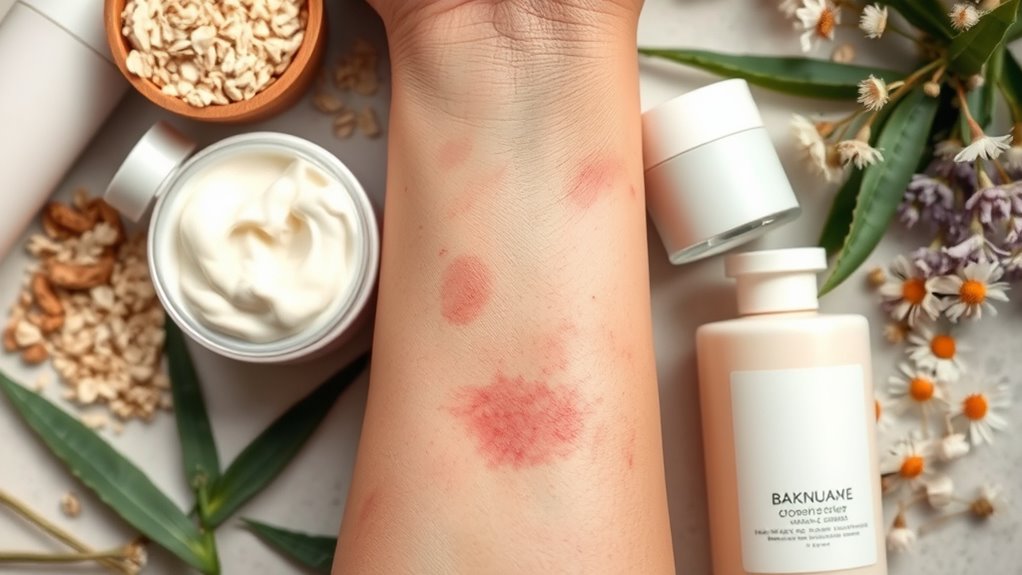
Choosing the right skin care practices and products can make a significant difference in managing eczema. Use gentle, fragrance-free cleansers to avoid irritation, and opt for thick, fragrance-free moisturizers that lock in moisture. Apply moisturizers immediately after bathing to help retain hydration. Avoid harsh soaps, scrubbing, or hot water, which can worsen symptoms. When selecting products, check labels for eczema-friendly ingredients like ceramides and colloidal oatmeal. Be cautious with new products—test a small patch first to check for reactions. Keep your skin hydrated throughout the day, especially in dry or cold weather. Incorporating hydrating routines such as humidifiers can also help maintain skin moisture levels. Consistent, gentle skin care habits help reduce flare-ups and soothe irritated skin, making it easier to control eczema symptoms effectively.
Stress and Its Impact on Skin Health
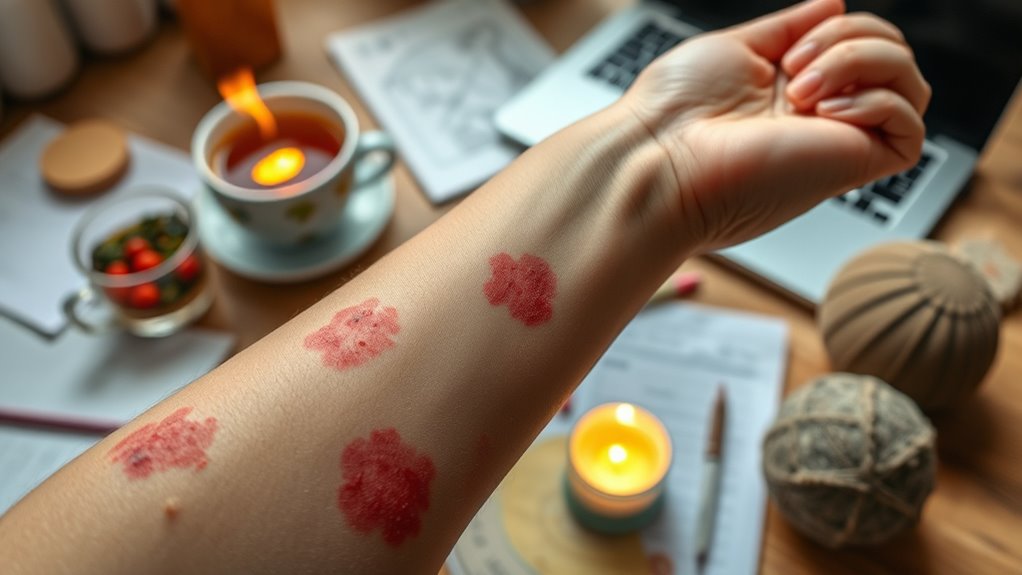
Stress can directly impact your skin health by triggering inflammation and weakening your skin’s natural barrier. When you’re stressed, your body releases hormones like cortisol, which can increase inflammation and make your skin more sensitive. This heightened sensitivity can lead to flare-ups of eczema, making your skin itchier and more prone to irritation. Additionally, stress can impair your skin’s ability to repair itself, prolonging healing times and worsening existing symptoms. You might notice that during stressful periods, your eczema symptoms intensify or become harder to control. Managing stress is essential because it not only affects your mental well-being but also plays a significant role in your skin’s health. Recognizing stress as a trigger helps you take steps to minimize its impact on your skin. Understanding how vetted products can support your skincare routine may further aid in managing eczema symptoms during stressful times.
Tips for Preventing and Managing Flare-Ups
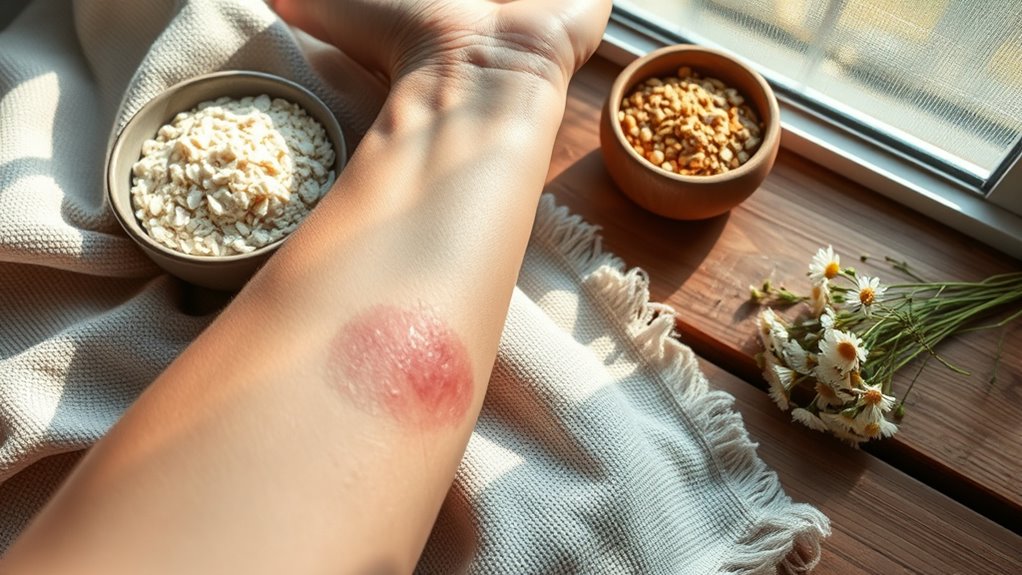
Managing stress effectively can considerably reduce the frequency and severity of eczema flare-ups. To do this, prioritize relaxation techniques like deep breathing, meditation, or yoga. Keep your skin moisturized daily with fragrance-free creams or ointments to prevent dryness, a common trigger. Avoid known irritants such as harsh soaps, detergents, and synthetic fabrics. Wear loose, breathable clothing to minimize skin irritation. Maintain a consistent skincare routine and avoid scratching when your skin itches—try tapping or gently pressing instead. Keep a diary to identify personal triggers and monitor flare-ups. If symptoms worsen, consult your healthcare provider for tailored treatments, such as topical medications or antihistamines. Additionally, some Kia Tuning modifications, like engine or suspension upgrades, can help reduce physical stress and improve overall comfort, indirectly benefiting skin health. With these proactive steps, you can better control your eczema and reduce flare-up frequency.
Frequently Asked Questions
Can Weather Changes Worsen Eczema Symptoms?
Weather changes can definitely worsen your eczema symptoms. Cold, dry air often strips moisture from your skin, making eczema flare-ups more likely. Conversely, hot, humid weather can cause sweating and irritation, which also triggers symptoms. You might notice your skin reacting to sudden shifts in temperature or humidity. To help, keep your skin moisturized, wear appropriate clothing, and avoid extreme weather conditions whenever possible to reduce flare-ups.
Are There Specific Clothing Materials That Reduce Eczema Flare-Ups?
You might find that wearing clothing made from soft, natural fibers can help reduce eczema flare-ups. Materials like cotton, silk, and bamboo are gentle on your skin and allow it to breathe, minimizing irritation. Avoid rough or synthetic fabrics like polyester or wool, which can trap heat and moisture, worsening symptoms. Choosing loose-fitting, breathable clothes can make a significant difference in managing your eczema and keeping flare-ups at bay.
How Do Seasonal Allergies Influence Eczema Severity?
Seasonal allergies can markedly worsen your eczema symptoms. When pollen, mold, or other allergens are high, your immune system reacts more intensely, leading to increased inflammation and itchiness. You might notice flare-ups during certain times of the year. To help, you should monitor local allergy forecasts, keep windows closed, and shower after being outdoors. Using allergy medications as recommended can also reduce your eczema severity during allergy seasons.
What Role Does Humidity Play in Managing Eczema?
Humidity levels markedly impact your eczema. When the air is too dry, your skin loses moisture, leading to increased irritation and flare-ups. Conversely, high humidity keeps your skin hydrated and helps prevent dryness. Maintaining a balanced humidity—around 40-50%—can soothe your skin and reduce eczema symptoms. Using a humidifier in dry environments or a dehumidifier in humid conditions helps you control moisture levels and keep your skin comfortable.
Are Artificial Fragrances More Problematic Than Natural Ones?
You might think natural fragrances are gentler, but both natural and artificial scents can irritate your skin. While natural fragrances come from plant extracts, they still contain compounds that may trigger eczema. Artificial fragrances are often more problematic because they contain synthetic chemicals, which can be more irritating. Ultimately, you should avoid both if you notice sensitivities, and always check product labels to protect your skin.
Conclusion
By understanding your triggers—from environmental factors to stress—you can better manage eczema. Sometimes, a simple change like switching skincare products or adjusting your diet makes all the difference. You might find that relaxing more or avoiding certain soaps unexpectedly reduces flare-ups. It’s funny how small habits can have a big impact. Keep experimenting and paying attention—you might be surprised what helps you keep your skin calmer and healthier.









